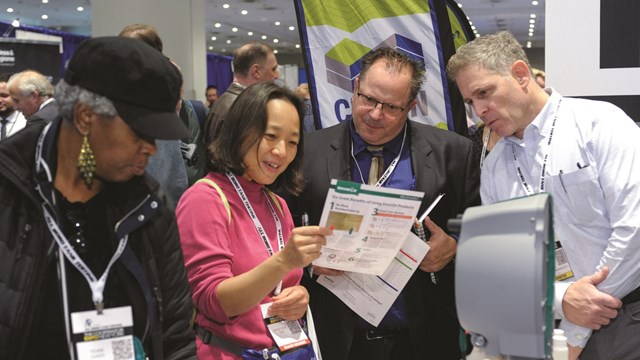Whether dealing with technology, administration or communication, on any given day property managers and managing agents are required to be jacks of all trades. And while some managers might actually have a practical background in plumbing or finance, it’s impossible for even the most seasoned professional to understand all aspects of running a multifamily property. That’s why engaging in continuing education is essential to maintaining a safe, successful, and financially solvent property.
More Than Just Paying Bills
“The role of property managers today continues to evolve beyond the typical operational responsibilities of ensuring common areas are clean or collecting rent,” says Tom Padilla, senior vice president for the Manhattan-based FirstService Residential. “These professionals must also respond to a host of residents’ lifestyle demands, delivering on resort-style amenities, programming and services. In order to effectively serve an increasingly sophisticated client base, today’s practitioners must be well-versed in finance, law, energy, insurance, technology, construction, project management, customer service, and many other areas.”
According to Dawn Bauman, senior vice president of government and public affairs at the Community Associations Institute (CAI), a national organization dealing with co-ops, condos, and HOAs, “There is a variety of education available to property managers across the country, though there are very few colleges that offer programming, coursework, or degree work for this field. We’re one organization —probably the largest and only national one—offering education in this area.”
Bauman notes that there are colleges like Virginia Tech that offer a property management degree, with a class or two focused on co-ops, condominiums, and HOAs. She also notes that Virginia Tech only offers one class on the issue called “specialty housing,” but that there are community colleges that have taken CAI’s curriculum and built coursework around it.
“We have a road map of coursework offering everything from the essentials to core competency areas,” says Bauman. “The core competency areas are facilities, maintenance, HVAC, communications with residents, leadership in the community, insurance and risk management, financial management and community governance.”
Other Options
Some larger property management firms also offer continuing education to their managers. The FirstService Residential School of Professional Development offers its associates a comprehensive course curriculum, explains Padilla—from specialized property management classes to analyzing financial statements.
“Managers and building staff also gain hands-on experience in the company’s Learning Center, where they receive practical training and certification in building systems and operations,” says Padilla. “We recently added ‘FirstClass,’ our online learning platform, to our library of education tools.” He explains that FirstClass provides associates with a variety of resources, including the noted online courses, books, videos and webinars to drive an associate’s professional development. “Nearly a third of the entire company’s associates are registered in the program, which is updated regularly and can be easily accessed via mobile devices and desktops.”
To keep pace with industry advancements, individual management firms may offer their agents anything from audio books, videos and live instructor-led webinars designed to help advance their respective skills, improve service delivery, and achieve personal career goals. Different companies may or may not make participation in such programs mandatory, and topics could be anything from ethics and disciplinary action to labor relations, façade inspections, Occupational Safety and Health Administration (OSHA) training, cooling tower/boiler essentials, and heat timer controls.
While many classes tend to be the more traditional in-person learning people are used to, the number of online classes for property managers has expanded. “We offer courses in-person and online,” says Bauman. “In-person courses are offered 10 times a year around the country, but if the timing or location doesn’t work you can take it at any time online.”
Bauman also notes that local CAI chapters have, “monthly luncheons that cover a topic, but that there are also more substantive classes every year that cover contemporary issues in community management over a couple of days. Those talk about things like litigation training, in-depth conversation about the transition between developer control to homeowner control, and environmental sustainability issues.”
Continuing Education Benefits
Continuing education, Padilla contends, is necessary to handle the numerous challenges and complex demands of managing multifamily properties. For example, when the New York City’s Department of Buildings (DOB) launched its Façade Inspection Safety Program (FISP), for example, a DOB assistant commissioner visited FirstService Residential to educate company managers on the new balcony and handrail codes.
“We know it’s equally as important for building personnel to have a thorough understanding of a property’s equipment and how to manage its systems,” says Padilla. “Benefits include enhancements to safety, efficiency, system operations and resident comfort, as well as a reduction in maintenance costs and fewer service disruptions. “More than 200 of our staffers recently received Occupational Safety and Health Administration (OSHA) certification after attending a hazard prevention course.”
According to Russell, whether a union member or an employee, the majority of continuing education courses are paid for in full or part by the union or the manager’s company. And from time to time, she says that board members will elect to take courses to stay in step with industry advancements. “These courses are for those who are actively engaged in the industry. It’s not to take one course and then wait five years to continue with another course—it doesn’t work that way,” she says. “These courses are designed to help you maintain your muscle.”
In Padilla’s view, professional development and advancement courses are a vital role to staying current with the ever-changing demands of residents. To this end, he says that property managers must be fluid and willing to update methods, learn new tactics and expand industry knowledge in order to deliver on resident expectations and provide a holistic living experience.
“While individuals come to the company with a variety of backgrounds, skills and experience, they comprise one unified team of professionals with a passion and commitment to add value and enhance their clients’ lifestyles,” says Padilla. “By encouraging continued education amongst associates, the company is rewarded with a strong, capable and experienced staff that can drive company success from the ground up.”
Buying In
In some instances, seasoned property managers and managing agents may look at continuing education as a time sink. They feel that after years – even decades —on the job, they are proficient and don’t need to spend eight hours on a Saturday in a classroom. While this may be true to a certain extent, there is value in older dogs learning new tricks.
By participating in continuing education, “Managers can expect to gain a deeper understanding for all aspects of community management including legal and insurance issues, energy management, finance, technology implementation, condo/coop/rental management, and many more,” says Padilla.
Of course, in addition to the time commitment involved, there are costs associated with continuing education. While managers might not have to pay directly out-of-pocket for some courses or workshops, someone must foot the bill.
Bauman notes that from time to time communities themselves will pay for such courses, though there are managers who will bear the brunt of it if they see the benefit. “We find for the most part, either the management company or community association pay for the classes, but there are managers who do pay for the classes out of their own pocket,” she says. She adds that the costs for most of their classes sit around $450.
“We have had board members take the Building Systems class too, because board members also want to learn more about their buildings,” says Peter Grech of the New York Superintendents Technical Association. “In this class we teach every aspect of the building—all the equipment, how it works and how to maintain the equipment.”
“For those looking to progress their careers with the help of continued education programs, you get what you give. Investing the time and resources is necessary to take the next step; we are committed to investing in our employees to lead them to success,” says Padilla. “Associates can enroll in learning platforms like FirstClass at any time, and customize their ongoing education to fit into their personal schedules.”
No matter how long you or your building’s manager have been on the job, in the dynamic world of property management, there’s always something new to learn. By staying abreast of the educational and professional enrichment opportunities available, you (or your community’s manager) can make sure you’ve got the newest, sharpest tools at your disposal to make your own job easier and your properties run more smoothly.
W.B. King is a freelance writer and reporter for The New Jersey Cooperator.










Leave a Comment